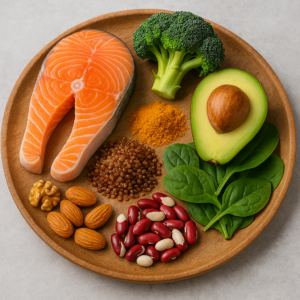Anti-inflammatory Diet: Eat to Feel Better Every Day
Chronic inflammation has been linked to many of today’s most common health issues—from fatigue and joint pain to more serious conditions like heart disease, diabetes, and autoimmune disorders. The good news? You can take control of your health through something as simple and accessible as your plate. The anti-inflammatory diet is gaining traction in the U.S. because it focuses on whole, nutrient-rich foods that naturally help reduce inflammation and promote overall well-being.
What Is an Anti-inflammatory Diet?
An anti-inflammatory diet isn’t about strict rules or extreme restrictions. Instead, it’s a sustainable and flexible way of eating that emphasizes natural, unprocessed foods while limiting ingredients that promote inflammation. Think of it more as a lifestyle than a diet.
Foods encouraged in an anti-inflammatory diet include:
• Leafy greens (like spinach, kale, and arugula)
• Colorful vegetables (carrots, beets, bell peppers)
• Berries (blueberries, strawberries, blackberries)
• Fatty fish (salmon, sardines, mackerel)
• Whole grains (quinoa, brown rice, oats)
• Nuts and seeds (walnuts, chia seeds, flaxseeds)
• Herbs and spices (especially turmeric and ginger)
• Healthy oils (like extra virgin olive oil)
On the flip side, it’s wise to avoid or limit:
• Processed meats
• Refined carbs and added sugars
• Fried and fast foods
• Artificial additives and trans fats
How the Anti-inflammatory Diet Works
When your body is consistently exposed to inflammatory foods or stressors, it begins to respond defensively. Over time, this can lead to persistent low-level inflammation, which may go unnoticed at first but gradually contributes to chronic diseases. The anti-inflammatory diet aims to calm this response and support the body’s natural healing processes.
One of the keys to this approach is its high concentration of antioxidants and polyphenols—compounds found in plants that fight oxidative stress and inflammation. For example, foods like berries, dark chocolate, and green tea are loaded with these protective substances.
Benefits You Can Feel
The anti-inflammatory diet doesn’t just improve internal health—it often leads to visible, tangible results. Many people who adopt this way of eating report experiencing:
• Increased energy and mental clarity
• Reduced joint and muscle pain
• Better digestion and gut health
• More stable blood sugar levels
• Healthier skin and less acne or redness
• Long-term prevention of chronic diseases
These effects aren’t just anecdotal—research continues to show that diets rich in anti-inflammatory foods can significantly lower the risk of conditions like cardiovascular disease, Alzheimer’s, and certain types of cancer.
A Day on the Anti-inflammatory Diet
Want to know what a day on the anti-inflammatory diet could look like? Here’s a simple sample menu:
Breakfast:
Oatmeal topped with blueberries, walnuts, and a sprinkle of cinnamon
Green tea or lemon water
Lunch:
Grilled salmon over a bed of quinoa and mixed greens, with avocado and olive oil vinaigrette
Snack:
Hummus with carrot sticks or an apple with almond butter
Dinner:
Stir-fried tofu with broccoli, bell peppers, garlic, and ginger over brown rice
Dessert (optional):
A few squares of dark chocolate (70% cocoa or more)
This approach is not only anti-inflammatory but also delicious, colorful, and satisfying.
Tips to Get Started
1. Start slow. You don’t have to change everything overnight. Begin by adding more vegetables to your meals or swapping white bread for whole grains.
2. Cook more at home. Homemade meals give you full control over ingredients and cooking methods.
3. Read labels. Processed foods often contain hidden sugars, refined oils, and preservatives.
4. Stay hydrated. Water helps flush toxins and supports every bodily function. Herbal teas are also great additions.
5. Listen to your body. Everyone’s response is different—track how you feel after making changes.
Is the Anti-inflammatory Diet Right for You?
Almost anyone can benefit from reducing inflammation, but the anti-inflammatory diet is especially helpful for people dealing with:
• Autoimmune diseases (like rheumatoid arthritis or lupus)
• Digestive disorders (such as IBS or Crohn’s)
• Heart disease or high cholesterol
• Type 2 diabetes or prediabetes
• Skin issues (like eczema or psoriasis)
However, as with any major dietary shift, it’s always a good idea to consult with a healthcare professional or registered dietitian—especially if you have existing conditions or are taking medications.
Final Thoughts
The anti-inflammatory diet is more than a food trend—it’s a powerful, science-backed strategy to feel better from the inside out. By choosing whole foods that nourish your body and reduce inflammation, you’re investing in your long-term health, energy, and quality of life.
Whether you’re trying to manage symptoms, prevent illness, or simply feel your best, embracing the anti-inflammatory lifestyle is a smart and delicious way to get there.


